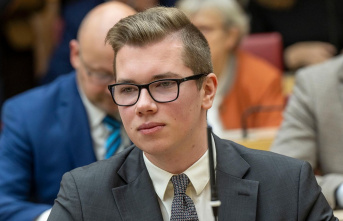When the Supreme Court overturned the landmark ruling on U.S. abortion law -- the Roe v Wade precedent -- in June, it drew national and international attention. The conservative majority on the Supreme Court judges is seen as Donald Trump's true political legacy - prepared well in advance by Republican power broker Mitch McConnell. He's known for a long time: Presidents come and go. Above all, however, US society can be shaped in the long term through case law. Justices of the US Supreme Court are appointed for life. In the foreseeable future, it can therefore be expected that the conservative point of view will generally prevail on the decisive questions.
Since the end of Roe v Wade, Liberals and Democrats fear that more liberal civil rights are at stake. The anxious question is: how far to the right will the US drift? And what does that mean for US society? John Roberts, chief of the Supreme Court, says normalcy has returned with the start of the new session this Monday. People can attend the public sessions, have the opportunity to verbally present their arguments on the pending cases, and all barricades intended to keep protesters out have been cleared outside the Washington D.C. courthouse. dismantled again. "The more normal the better," says Roberts. But what "normal" means has been unclear to many since Roe v Wade's exit.
"The court acted ideologically to get the outcome these judges wanted," said Eric Holder, attorney general during Barack Obama's administration, in a CNN interview regarding the abortion law decision. On the same TV channel, John Malcolm of the conservative Heritage Foundation countered that "the left had prevailed for a very, very long time" in the highest judiciary. But if things don't go according to their ideas, "the left" will immediately question the entire Supreme Court, Malcolm criticized.
Whichever legal opinion one follows: it seems indisputable that the achievements of rather liberal jurisprudence of the past decades are at stake. This could be the focus of the current session of the Supreme Court:
Several cases in this session affect the right to fair elections. Moore v Harper (Republican spokesman in North Carolina v suffrage activist) is primarily about the distribution of constituencies in the southern state on the Atlantic coast. In fact, the case is fundamental. The decision could mean that the state legislatures (and thus the respective majority faction) have a completely free hand in shaping the electoral process in federal elections - and without a manipulative favoritism of one side or violations of the state constitution being prosecuted or could be stopped by objection from governors. The basis is the Independent State Legislature Doctrine, which is very popular with Republicans and reads such a wealth of power out of the US Constitution. This would also open the door to so-called gerrymandering, i.e. the practice of tailoring the constituencies to the distribution of the population in such a way that the chances of an election victory increase enormously. Republicans generally benefit from this practice. In February, the North Carolina Supreme Court ruled the request "unconstitutional beyond a reasonable doubt." It is feared that the conservative majority in the Supreme Court will see things differently and legalize this type of electoral interference.
Similarly, the case of Milligan v Merrill, which concerns the congressional districts in the state of Alabama. According to this, a majority by a black electorate is only possible in one of seven districts. Because in recent years the proportion of blacks in the population has increased (now at 27 percent) while the proportion of whites has decreased (from 68 to 64 percent), the current borough distribution discriminates against blacks. The Supreme Court has already put a decision by a lower court on hold, so the current rule will likely apply to the midterms. Three Democratic judges said they saw "a clear dilution of votes" to the detriment of the black population. The fundamental decision of the US Supreme Court is still pending. Civil rights and minority representatives are citing Section 2 of the Voting Rights Act in the case, which allows racially discriminatory ward allocations to be challenged.
The case of 303 Creative LLC v Elenis has the potential to be a major LGBTQ rights dispute, although the issue itself is quite simple. It comes as a follow-up to a 2018 Supreme Court decision when the Supreme Court upheld a baker who refused to bake cakes for same-sex weddings. However, this decision related exclusively to this specific issue, while the currently pending case is more fundamental. A web designer from Colorado who creates websites for weddings, but does not want to do this for same-sex couples for religious reasons, insists on the First Amendment to the US Constitution, which guarantees freedom of speech and religion, among other things. Lower courts initially rejected the web designer's request. But the fundamental question now is whether creatives must remain silent about their stance when offering their services on the free market, or whether their rights are restricted when – as the law currently provides – they offer their goods or services to all interested customers "regardless of the protected characteristics," according to Colorado Attorney General Phil Weiser.
When it comes to college admissions, the organization Students for Fair Admissions (SFFA) has complained about racism in the procedures at renowned universities. Specifically, the admissions process at Harvard University discriminates against Asian applicants and the process at the University of North Carolina (UNC) disadvantages white and Asian applicants. The universities countered that race was just one characteristic that was taken into account when applying. And should this feature be banned, it will have a major impact on the number of underrepresented students on campus, the institutions argued. Should an applicant's race really play a role in admission to college? According to experts, the decision of the Supreme Court will influence whether it will be possible to promote equal educational opportunities effectively.
It is still unclear when the Court of Justice will make these and other judgments in detail. Currently, the proceedings are partly in oral hearings. According to the US media, America is expecting a "historic session" with decisions that could shake up voting rights in particular.
Quellen: CNN; Axios; Supreme Court of the United States, "New York Times"












